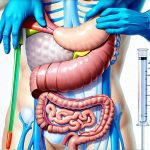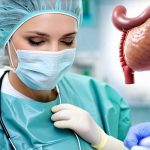Post-operative digestive issues are surprisingly common, affecting many patients after surgery – even those that weren’t directly on the abdomen. The disruption of anesthesia, pain medication, surgical stress itself, and changes in diet can all contribute to a range of gastrointestinal problems. Understanding what to expect, recognizing symptoms, and knowing how to manage these issues is crucial for a smoother recovery process. This article will focus specifically on post-operative digestive disturbances (often referred to as K91, though this isn’t a formal medical diagnosis but a commonly used term within patient communities relating to post-surgical GI distress) – outlining the causes, symptoms, and strategies for effective management.
What is Post-Operative Digestive Distress?
Post-operative digestive distress encompasses a variety of gastrointestinal (GI) issues that arise following surgery. It’s not a single defined condition but rather a collection of symptoms indicating disruption in normal digestive function. The severity can range from mild bloating and constipation to more debilitating diarrhea, nausea, vomiting, and abdominal pain. Often, these issues are temporary, resolving within days or weeks as the body adjusts. However, for some individuals, the problems can be prolonged and require medical attention. While “K91” is a patient-created term gaining traction online, it represents the shared experience of chronic digestive upset after surgery and highlights the need for better understanding and support. It’s important to remember that this isn’t a formally recognized medical diagnosis; instead, it describes a cluster of symptoms many patients report post-surgery.
Common Symptoms and Associated Conditions
The range of symptoms associated with post-operative digestive distress is quite broad, reflecting the complexity of the digestive system and individual responses to surgery. Some of the most frequently reported symptoms include: bloating, gas, constipation, diarrhea, nausea, vomiting, abdominal pain (ranging from mild discomfort to severe cramping), altered bowel habits (changes in frequency or consistency), heartburn/acid reflux, and food intolerances developing after surgery. A particularly frustrating aspect for many is the seemingly random nature of these symptoms – they can flare up unexpectedly and subside just as quickly.
Beyond the primary digestive symptoms, some associated conditions often emerge or are exacerbated post-surgery. These include Small Intestinal Bacterial Overgrowth (SIBO), Post-Infectious Irritable Bowel Syndrome (PI-IBS) which can develop after a particularly disruptive period of diarrhea, and nutrient deficiencies due to malabsorption. Additionally, anxiety and stress related to the surgery itself can contribute to digestive problems, creating a vicious cycle. It’s crucial to differentiate between typical post-operative healing and developing longer-term issues requiring specific treatment.
Causes and Risk Factors
Several factors can contribute to post-operative digestive distress. The most immediate causes relate directly to the surgical process itself. Anesthesia, while necessary, significantly alters gut motility (the movement of food through the digestive tract), often leading to temporary constipation. Pain medication, particularly opioids, is notorious for slowing down digestion and causing constipation as a side effect. Surgery also creates physiological stress on the body, releasing hormones that can disrupt normal GI function.
Beyond these direct effects, pre-existing conditions can increase risk. Individuals with a history of IBS, Crohn’s disease, ulcerative colitis, or other digestive disorders are more likely to experience post-operative complications. The type of surgery performed also plays a role; abdominal surgeries naturally have a greater impact on the digestive system than procedures elsewhere in the body. Furthermore, dietary habits before and after surgery can contribute – poor nutrition weakens the gut microbiome and makes it less resilient. Finally, prolonged antibiotic use during or after surgery can disrupt the delicate balance of gut bacteria, leading to SIBO or other issues.
Diagnosis, Treatment, and Living with the Condition
This section will cover how post-operative digestive distress is diagnosed, what treatment options are available for managing symptoms, and strategies for living a fuller life while coping with these challenges. Accurate diagnosis is key to effective management because it helps determine the underlying cause of the digestive issues and guides appropriate treatment choices. It’s important to remember that there isn’t always a clear-cut answer, and sometimes a process of elimination is necessary.
Diagnosis and When to See a Doctor
Diagnosing post-operative digestive distress can be complex. Doctors will typically start by taking a detailed medical history, including the type of surgery performed, medications taken, pre-existing conditions, and a thorough description of your symptoms. A physical examination will also be conducted. Initial tests might include stool analysis to rule out infections or parasites, blood tests to check for inflammation, anemia, or nutrient deficiencies, and potentially a colonoscopy if significant changes in bowel habits are present.
More specialized testing may be needed to identify underlying conditions like SIBO (breath test) or lactose intolerance/malabsorption (hydrogen breath test). Food diaries can help pinpoint potential food triggers. It’s important to consult a doctor if your digestive symptoms are severe, persistent, or interfering with your daily life. Red flags include: prolonged diarrhea lasting more than a few days, severe abdominal pain, bloody stools, fever, dehydration, and inability to keep down fluids. Don’t hesitate to seek medical attention – early diagnosis and intervention can prevent complications.
Treatment Options
Treatment for post-operative digestive distress is largely symptomatic and tailored to the individual’s specific needs. For constipation, increasing fluid intake, consuming fiber-rich foods (gradually!), and gentle exercise are often recommended. Over-the-counter stool softeners or laxatives may be used short-term, but long-term reliance should be avoided. For diarrhea, staying hydrated is crucial, along with following a bland diet (BRAT diet – bananas, rice, applesauce, toast) until symptoms subside. Anti-diarrheal medications might be prescribed in some cases.
Probiotics can help restore the balance of gut bacteria disrupted by surgery or antibiotics. However, choosing the right probiotic strain is important; consult with your doctor or a registered dietitian for guidance. Dietary changes are often essential – identifying and eliminating food triggers (through elimination diets guided by a professional) can significantly reduce symptoms. For SIBO, antibiotic therapy may be necessary to reduce bacterial overgrowth. In cases of severe pain or nausea, stronger medications might be prescribed temporarily. Addressing underlying anxiety or stress through therapies like mindfulness or counseling can also play a vital role in managing digestive symptoms.
Living with Post-Operative Digestive Distress
Living with chronic digestive issues requires patience and self-management. Keep a detailed symptom diary to track your triggers and responses to different treatments. Focus on building a healthy lifestyle that supports gut health: prioritize sleep, manage stress levels, stay hydrated, and eat a balanced diet rich in whole foods. Consider working with a registered dietitian who specializes in digestive disorders – they can help you develop a personalized nutrition plan.
Support groups (both online and in-person) can provide valuable emotional support and practical advice from others experiencing similar challenges. Remember that recovery is not linear; there will be good days and bad days. Be kind to yourself, celebrate small victories, and don’t hesitate to reach out for help when you need it. It’s also important to advocate for your health – communicate openly with your healthcare team about your symptoms and concerns.
Summary
Post-operative digestive distress is a common but often overlooked consequence of surgery. Understanding the causes, recognizing the symptoms, and proactively managing the condition are essential for improving quality of life after surgery. While it can be frustrating, remember that there are effective treatments available, and with the right support and self-care strategies, you can navigate this challenge and regain digestive comfort.
Have you been diagnosed with post-operative digestive distress? Share your experience or ask your questions in the comments — we’re here to help.


















